 1973 saw many oil producing countries become independent and nationalise their oil. Some succeeded and others, like Australia, were brought to heal. Ever since 1973, the US and Europe have been trying to reverse these nationalisations. Venezuela is a case in point.
1973 saw many oil producing countries become independent and nationalise their oil. Some succeeded and others, like Australia, were brought to heal. Ever since 1973, the US and Europe have been trying to reverse these nationalisations. Venezuela is a case in point.
In a gesture befitting Lewis Carol's Queen of Hearts, the United States has suddenly abandoned all pretences of lawful procedure and common sense by officially declaring that opposition leader, Juan Guaidó is the real president of Venezuela, not Nicolás Maduro Moros, who was actually elected President by Venezuelans.
To put things in perspective: Getting rid of President Maduro because the 2015 parliamentary election placed his own party in the minority would be like making President Trump step down because the Democrats are now in the majority in Congress - to paraphrase Venezuela's diplomat to Russia.[Article by Sheila Newman with James Sinnamon]
It is also baffling to see French President Macron call for Maduro to step down when his own country is convulsing with Gilets jaunes (Yellow Vest) protests, who all call for Macron to step down. Don't politicians have any sense of irony?
Interesting also to see Turkish President Erdogan stick up for Maduro by saying nothing can be resolved democratically without an election.
Meanwhile South America: Columbia, Brazil, Chile, are also baying for Maduro to step down, as you would expect of US lackies.
Why should Maduro step down?
Why should Maduro step down? Why is no-one talking about how US trade sanctions have impoverished Venezuela? The reason for these sanctions is that the US wants control over Venezuelan oil, which means that it must destroy the socialist government that nationalised oil. Will they go so far as to invade and bomb Venezuela like the did other oil-producers whose leaders they condemned, like Iraq, Libya, and Syria?
With the help of much money poured into Venezuela by the US Government agencies the United States government have succeeded in doing to Venezuela what they did to Ukraine in 2014 when Victoria Nuland promised the Maidan protesters face-to-face $5 billion to assist in "building democracy".
A propos of the US interference on Russia’s doorstep in Ukraine (and Georgia and the Middle East), there is symmetrical justice in Russia's plans to build a military base in Venezuela, although these may also have caused a panic in the US leading to this overt coup-attempt.
In Latin America, only Cuba, Bolivia and Mexico have defended Maduro. Mexican president, Lopez Obrador, said that Mexico has returned to the non-intervention policy Mexico practiced from the 1960s — when it resisted U.S. pressure to condemn or isolate Cuba — until 2000, when the conservative National Action Party began to adopt a more activist, U.S.-allied stance in foreign affairs. Russia, China, India and South Africa buy oil from Venezuela and are generally sympathetic or have a policy of non-interventionism.
The EU has called for new elections, but without condemning the United States meddling in Venezuela. This further reinforces the narrative or the claim that the democratically elected President Maduro is illegitimate. If new elections were called, in the current geopolitical circumstances, this would result in the ousting of President Maduro in an election rigged with many millions of United States dollars and with thousands of clandestine US intelligence agency operatives. The elections would also be conducted under the guns of the US Navy, Army, Air Force and Marine Corps in the Central American Carribean and neighboring countries on the South American continent.
This has all happened before ...
This has all happened before, but unofficially and more covertly: In 2002, a group marched on the Presidential palace demanding Hugo Chávez’s resignation, which the President refused. He was arrested and imprisoned. Pedro Carmona, President of the Venezuelan Chamber of Commerce, which receives funding from the US National Endowment for Democracy (a right-wing regime-change NGO that calls economic liberalism 'democracy'), was installed as Venezuelan President on the 11th of April 2002. On the 12th of April, the US President’s spokesman, Ari Fleischer, endorsed the Carmona government. But, on the 13th of April the Presidential guard and the army arrested Carmona. Next the opposition collected signatures from 20 per cent of the electorate required under Chávez’s constitution to initiate a referendum to sack the president, but Chávez won the referendum.
... and with the same excuses
The oil countershock of 1979 culminated in currency devaluation by one third and a change to a the Social Christians (SC) government, which remained in power until 1983, when Democratic Action (DA) or Acción Democrática, (AD) in Spanish, was returned under Jaime Lusinchi. Despite promises to diversify the economy and deliver on housing, public health and education, the situation continued to deteriorate. That is, the kind of government that the US wants to install, one that will privatise Venezuelan oil, failed to develop and diversify the economy, leaving it almost exclusively oil-dependent, with most of its population in poverty.
Hugo Chavez and Maduro were later both accused of causing this same problem of lack of economic diversification.In 2019, President Trump and Vice President Mike Pence were using it again as an excuse to rattle sabres and unilaterally denounce President Maduro and, bizarrely, recognise Juan Guaidó as the interim president of Venezuela.
Back to our history: Under Jaime Lusinchi and Acción Democrática, (AD), the Venezuelan economy was simply being mined by foreign interests, with no consideration for the self-determination of its population. In 1988 another DA president, Carlos Andrés Pérez, introduced an austerity regime, removing subsidies on gasoline as well as on a number of important consumables, culminating in hunger riots in Caracas, with a death toll of thousands.
Two attempted military coups took place against a background of continued repression in 1992 and Hugo Chávez led one of them. President Pérez later went to prison for 28 months with the government limping along under another recycled leader, Caldera, whose foreign policy was very USA friendly. In 1995, 103 per cent inflation hit the Venezuelan middle class. In 1997 doctors, university professors, and national telephone company workers went on strike. In December 1998 Hugo Chávez won the Presidency.
Hugo Chávez, the 45th President of Venezuela, died on 5 March 2013 at the age of 58. His death triggered a presidential election which was constitutionally required to be called within 30 days. Nicolás Maduro served as interim president following Chávez's death until 14 April, because the Vice President did not want to take charge of the country as Chávez had nominated Nicolas Maduro as a successor.
Juan Guaidó's Popular Will Party (Voluntad Popular)
The Popular Will party came out of the Popular Will Movement, which was formed in 2009 by the usual suspects, including Democratic Action, the right-wing US business-backed party that had privatised oil.
The Democratic Unity Roundtable (Mesa de la Unidad Democrática (MUD) is a coalition of parties, notably Democratic Action, which formed in 2010 in opposition to Hugo Chavez's United Socialist Party of Venezuela.
Popular Will is supporting Juan Guaidó's Presidential Coup attempt.
Venezuela is situated at the very north of the South American continent on the southern shore of the Caribbean Sea. Venezuela is less than 2,000 kilometres south of the southern most tip of the United States, from which, since 1945, many wars against humanity have been launched since 1945. The sum total of deaths from these wars is in the millions.
Throughout Central America, the Carribbean and the South American continent are scattered a large number of United States' military bases from which further wars against Venezuela and other sovereign Latin American countries can be launched. Clearly any national government which wishes to govern in the interests of its people and not according to the dictates of the Unite States' elites, risks attracting US intervention to transform it into a client state, with a liberal economic economy, entailing debt and privatisations.
Venezuela, Chavez, Maduro & Latin-American oil on the world stage
This part of the article is adapted from Sheila Newman, “Venezuela, Chavez & Latin-American oil on the world stage”, Chapter 10 in Sheila Newman (Ed.) The Final Energy Crisis, Second Edition, Pluto Press,2008.[1]
“In 1998, or 168 years after independence, a tiny wealthy elite was separated by a vast chasm from the rest of the people, of whom one quarter were unemployed. This seems disgusting when you realize that Venezuela was then the second biggest [oil] exporter in the world and had received around 300 billion dollars in oil sales – or the equivalent of 20 Marshall Plans - over the preceding 25 years. It was in this context that Hugo Chávez and his social plan won the elections of 6 December 1998 with 56.24% of the votes.” [2] (Nicolas Lehoucq, Paris Institute for International Studies).
President Hugo Chávez, was a social revolutionary with a giant budget. In 2006 the EIA ranked Venezuela ninth in World Oil producers and sixth in World Oil Exporters. [3] For many of his countrymen, Chávez was seen as a towering figure of hope for rescue from a nightmare which began in 1498. But his Anglo critics portrayed him as an ogre treading clumsily over political alliances and destroying Venezuela’s oil-assets.[4]
Clearly Venezuela was pursuing a different political paradigm from that of the North American-led Anglophone countries. The Chávez government endorsed a Christian socialist philosophy directly opposite to the Protestant capitalist one of a wealthy elite divinely elected on earth. In the Chávez philosophy, Christ was the first socialist, sharing wealth among the poor; a rich man might only enter heaven by giving away his possessions to the poor; a good leader should give everything to his country.[5]
One political explanation for this difference is that Latin America ‘missed out’ on the progress model which dominates North America because, colonized by medieval Catholics, it was isolated from the development of Protestantism.[6]
Sociologist, Max Weber, theorized in The Protestant Ethic and the Spirit of Capitalism (1906) that Calvinism was the midwife of capitalism, delivering to the world the concepts of the ‘work ethic’ and of election to earthly prosperity as a reflection of God’s grace.
The work of Australian engineer and social analyst, Sharon Beder, supports a contrary view that the work ethic plus the progress model are driving the world over a cliff[7] and this is pretty much Chávez’s expressed view. Chávez also apparently shares a similar perspective to Al Gore’s on global warming, but that is where the similarities end.
From the 15th C the indigenous long-term stable clan and tribal populations of Chávez’s people were ravaged by invasion, immigration, disease, dispossession and slavery. The original peoples nearly died out, then, completely disorganized, ballooned in circumstances where child labour was the only source of additional income for low-wage landless people.[8] What is now called Venezuela contained a stable population estimated at around 400,000 Amerindians in 1498.[9] (In 2018 the population was over 28 million.) In the early 16th C King Charles Martel V granted Welsers German banking firm rights to exploit the people and resources of Venezuela in payment of a debt. The colony returned to the Spanish Crown within 20 years and hereditary land grants were made to conquistadores for a time, but later declared illegal. Meanwhile the Amerindians fought back until smallpox overwhelmed most of them in 1580.[10] Not until 1821 did Simón Bolívar win the long indigenous struggle for independence.[11]
In 1921 the discovery of oil permitted agricultural and industrial development. At the start of the Second World War Venezuela’s oil production was only exceeded by that of the United States. Much of the oil concession development involved attracted US, British, and Dutch companies. There was a period of dictatorship from 1948-1958, when Venezuela again became a democracy. It founded OPEC in 1960.[12]
The historic inequities of colonial land distribution[13] guaranteed a large population of impoverished rural labourers. As oil prices waxed and waned, productive agricultural holdings were neglected and waves of poor people left the country regions to look for work in the city, creating the slum of Caracas. Between 1959 and 1964 the government redistributed rural land to 150,000 families but many resold the land to speculators, it is said, because they had little education about farming and no ready market for their product.[14] Other wealth redistribution and educative policies were carried out but these programs failed to establish themselves against a background of depressed commodity prices and political schism. Although the Democratic Action Party (DA) had played an important role in Venezuela’s first democratic period (1945-1948), in the early 1960s it was aligned with the USA, although many Venezuelans were sympathetic to the Castro regime in Cuba, which was charged with supplying arms to guerrillas in 1963.[15] The DA government became increasingly repressive in the context of continued political unrest. In 1968 the Social Christians (SC) won government and remained in power until 1973.[16]
In the wave of nationalizations following the first oil-shock, despite its US sympathies, the DA Government created the State-run oil and natural gas company, Petroleos de Venezuela SA (PdVSA) in 1975-1976. PdVSA is Venezuela’s largest employer and provides 80 per cent of export earnings but, reflecting later trends to privatization, government revenue declined from 70.6 per cent in 1981 to 38 per cent in 2000.[17]
The oil countershock of 1979 culminated in currency devaluation by one third and a change to an SC government, which remained in power until 1983, when AD was returned under Jaime Lusinchi. Despite promises to diversify the economy and deliver on housing, public health and education, the situation continued to deteriorate.
Hugo Chavez and Maduro were later both accused of causing this same problem of lack of economic diversification. In 2019, President Trump and Vice President Mike Pence were using it again as an excuse to rattle sabres and unilaterally denounce President Maduro and, bizarrely, recognise Juan Guaidó as the interim president of Venezuela.
In 1988 another AD president, Carlos Andrés Pérez, introduced an austerity regime, removing subsidies on gasoline as well as on a number of important consumables, culminating in hunger riots in Caracas, with a death toll of thousands.
Two attempted military coups took place against a background of continued repression in 1992 and Hugo Chávez led one of them. President Pérez later went to prison for 28 months with the government limping along under another recycled leader, Caldera, whose foreign policy was very USA friendly. In 1995, 103 per cent inflation hit the Venezuelan middle class. In 1997 doctors, university professors, and national telephone company workers went on strike. In December 1998 Hugo Chávez won the Presidency.
On 30 December 1999 Venezuela’s 26th constitution was approved by 71 per cent of votes. The Senate was replaced by a single chamber National Assembly, and the Bolivarian Republic of Venezuela came into being, named after the National hero. Presidential terms increased from five to six years and limitations on presidents serving a second consecutive term were lifted, but it became possible for the public to sack a president through a publicly initiated referendum. Privatisation of the oil industry, social security, health care and other major state-owned sectors was outlawed.[18]
According to the EIA, “Nearly one-half of PdVSA’s employees walked off the job on December 2, 2002 in protest against the rule of President Chávez.”[19] But another report says that they were prevented from working in a ‘bosses lock-out’ where “a small group of managers, directors, supervisors and technicians organised the sabotage of production and brought the industry almost to a halt,” and Georgetown politics Professor commented that “The opposition (…) has also been extremely irresponsible in trying to demand [Chávez’s] resignation rather than trying to seek an electoral solution.”[20] If we assume that PdVSA management was responsible for the declining returns to the State by PdVSA over the decades, then the view that this was a ‘lock-out’ to preserve an undemocratic status-quo by discrediting the Chávez Government, seems persuasive. Chávez had provoked US insecurity about oil supply by criticizing the Free Trade of the Americas Act (FTAA) and US foreign policy. The Chávez government had sacked some directors of PdVSA who were in political disagreement with the Venezuelan executive. These people then led calls for a general strike along with a variety of opposition parties and the Fedcamaras (Venezuelan Chamber of Commerce), who are supported by the US National Endowment for Democracy. A group marched on the Presidential palace demanding Chávez’s resignation, which the President refused. He was arrested and imprisoned. Pedro Carmona, President of the Venezuelan Chamber of Commerce, which receives funding from the US National Endowment for Democracy, was installed as Venezuelan President on the 11th of April. On the 12th of April, the US President’s spokesman, Ari Fleischer, endorsed the Carmona government. But, on the 13th of April the Presidential guard and the army arrested Carmona. Next the opposition collected signatures from 20 per cent of the electorate required under Chávez’s constitution to initiate a referendum to sack the president, but Chávez won the referendum.[21]
The distribution of PdVSA income had been increasingly diverted to private concerns, with returns to the State falling from 70.6 per cent in 1981 to 38.6 per cent in 2000. Despite permanent damage to production from sabotage in the industrial disputes of December 2002, Chávez’s intervention had raised PdVSA returns to the state from 38.6 per cent to 50 per cent by 2004.[22]
Venezuela had for some time been a food importer, due to the country’s very poor system of land management, which Chávez tried to rectify in a major scheme. He seemed to be seeking regional self-sufficiency, with protection for local production. He was opposed to overconsumption, openly warning about oil depletion. He was highly critical of US human rights abuses, at home and abroad, and opposed free-marketism.
Obviously Chávez’s regime threatened many established interests in a seething international struggle for resource hegemony. The economy was still in recession and maintenance and consolidation of the section of the population which supported Chávez would require that he carry out his promises. Chávez’s friendship with Castro was a source of survival skills. So was his policy of strengthening regional Hispanic alliances.
There were a number of likely candidates, including Mexico, which had begun to import food from the US under the American ‘free trade’ agreement. Brazil, however, sensibly seeking independence from petroleum, was apparently counselled to drop its independence policies in exchange for leniency on international debt.[23]
Chávez actively sought more diversification in petroleum trading, initiating a ‘South-South diplomacy’ with sidelined and emerging polities in controversial and political oil-trade accords with Cuba, Argentina, Uruguay, Brazil, Spain, Iran, Libya, Nigeria, Qatar, India, China and Russia.[24] An agreement in October 2004 meant that Russian oil sales to the US were actually honoured by Venezuelan oil and Venezuelan sales to Europe were supplied by Russian oil. The Chávez government paid off $538m of Argentinian debt and agreed to provide contracts worth $500 m to Argentina.
In a fascinating avoidance of petrodollars, Chávez supplied 80,000 barrels of oil to Cuba a day, at a friendly price, with 20 per cent of payment in the form of the supply of 150,000 Cuban doctors to Venezuelan health.[25]
Most importantly, Chávez hoped to create a Latin American petroleum company, “Petrosur”, which would unite the public companies of Argentina, Bolivia, Brazil, Uruguay, Equator and Venezuela.
Mostly anglo-analysts intimated that anglo-oil companies would not touch Venezuela because of Chávez, and that the bitumus deposits of the Orinoco would not get developed, through lack of experts. But this began to look like sour grapes as plenty of the non-anglo oil companies – Russian LUKoil, China’s CNPC, Indian ONGC and Brazil’s Petrobas – did not seem to be put off.
Chávez did not neglect regional diplomacy among the underworld of arms trade and revolutionary militia.[27] And, after an attempted putsch in 2002, Chávez relied on Cuban Intelligence for personal protection. Not surprisingly the US Government disapproved.
On December 4, 2006, Chávez won his third six year term as president. In 2007 a referendum to make Chávez president for life was democratically defeated by 51 per cent.[28]
In the light of Venezuelan social and economic performance in the decades preceding Chávez it would have been hard for him to do worse than his predecessors and he seemed to be doing considerably better. Land redistribution is the basis of revolution and of social equity.[29] Venezuela signed an accord to give effective rights to its indigenous peoples.[30] Chávez allocated public and then private land to the landless in a program accompanied by massive agricultural education. [31] This was bound to upset the small elite of land-owners and speculators.
The Chávez government had better green credentials than any other petroleum producer. With an active commitment to mitigate the impacts of climate change and peak oil, it initiated new public transport, instituted organic farming as an important part of secondary school education, and facilitated a huge organic farm in the centre of Caracas. It also planned massive reforestation with the collection of 30 tonnes of seeds, and the planting of 100 million plants. [32]
The overwhelming positive signs of Chávez's example seemed to be what we needed for the 21st century.
In about 2010, the United States added to its traditional political harassment economic sanctions against Venezuela. The 2016 low oil-price agreement between Saudi Arabia and the United States then caused a huge reduction in Venezuela’s oil income. This massively depressed GDP and made it very hard for people to buy food and necessities.
In March 2013 Hugo Chavez died of cancer. He had nominated his successor as Maduro. Maduro ran for election and was elected President.
Unfortunately the United States stepped up its sanctions, making it even harder for Venezuela to operate. In the name of fighting communism and pretending it was motivated by humanitarian concerns, President Trump and Vice-President Pence spoke of regime-change overtly for the first time. Bizarrely, they ‘recognised’ the opposition leader as the true president, despite massive protests from Venezuelans.
NOTES
[1] Various documents named beneath, many of which have also referred to Venezuelan President Hugo Chávez’s speech at the 60th General Assembly of the United Nations in New York, on 15 September 2005.
[2] Lehoucq. (Translated here by S.M. Newman.)
[3] (All hydrocarbon liquids) http://www.eia.doe.gov/emeu/cabs/topworldtables1_2.htm
[4] For instance, the Economist unreasonably ignores the poverty of Venezuelan people under the old management of oil in a one-sided interpretation of events in “Oil's Dark Secret,” Aug 11 2006, Economist Intelligence Unit - Executive Briefing, http://www.economist.com/business/PrinterFriendly.cfm?story_id=7270301
[5] Lehoucq.
[6] In The Pan-American Dream, US conservative writer, Lawrence Harrison, attempts to explain the differences in economy, government, human rights and standard of living in American Hispanic societies according to Weberian theory.
[7] Articles by Sharon Beder on the Work Ethic. http://homepage.mac.com/herinst/sbeder/home.html#work.
[8] UNICEF estimated that 9.9 percent of children ages 5 to 14 years in Venezuela were working in the year 2000. Government of Venezuela, Multiple Indicator Cluster Survey (MICS): Standard Tables for Venezuela and Annex I: Indicators for Monitoring Progress at End-Decade, UNICEF, 2000, www.childinfo.org/MICS2/newreports/venezuela/venezuela.htm and http://www.childinfo.org/MICS2/EDind/exdanx1.pdf.
Doepke hypothesised that fertility falls where policies, such as education subsidies and restrictions on child labour affect the opportunity cost of education. The populations of South Korea and Brazil had begun to grow rapidly around the same time, but South Korea had an effective public education system, and strongly enforced child-labour restrictions, whereas Brazil had a weak public education system and poorly enforced anti-child-labour laws. Doepke, M., Growth and Fertility in the Long Run, Mimeo, University of Chicago, 2000. available in reduced form in Doepke, M. "Accounting for Fertility Decline During the Transition to Growth", Journal of Economic Growth, 9(3), 347-383, September 2004.
[9] http://www.nationsencyclopedia.com/Americas/Venezuela-HISTORY.html
[10] Ibid.
[11] Ibid
[12] http://news.bbc.co.uk/2/hi/business/2549589.stm
[13] www.forestpeoples.org/documents/conservation/Ven10c_jan04_ch6_eng.pdf
[14] Seth DeLong, “Venezuela's Agrarian Land Reform: More like Lincoln than Lenin”, COHA, February 25th 2005, http://www.venezuelanalysis.com/analysis/963
[15] http://www.nationsencyclopedia.com/Americas/Venezuela-HISTORY.html
[16] Ibid.
[17] Ibid and Lehoucq, Nicolas, “La redéfinition du rôle géopolitique Vénézuelien,” Institut d'étude des Relations Internationales Paris, www.memoireonline.com/11/06/287/m_redefinition-role-geopolitique-venezuelien0.html (accessed 21/9/2007) and Doizy, Arnaud, “La politique étrangère des Etats-Unis au Venezuela, la période Chavez (1999- 2007)” Université Panthéon-Assas paris II, http://www.memoireonline.com/06/07/491/m_politique-etrangere-etats-unis-venezuela-periode-chavez2.html (Accessed 22/9/07)
[18] www.nationsencyclopedia.com/Americas/Venezuela-HISTORY.html
[19] “Nearly one-half of PdVSA’s employees walked off the job on December 2, 2002 in protest against the rule of President Chavez.” EIA Reports : www.eia.doe.gov/emeu/cabs/Venezuela/Oil.html Some other anti-Chávez sources: http://marketplace.publicradio.org/display/web/2007/09/13/venezuelan_oil_expats_resurfacing/ Some comments on US stance:
Professor of Politics, Georgetown University, Arturo Valenzuela commented on the PBS Jim Lehrer Newshour, “Troubled Nation”, December 17, 2002, “…Unfortunately, the radicals on both sides are maintaining this conflict. The opposition, for example, in my view, has also been extremely irresponsible in trying to demand his resignation rather than trying to seek an electoral solution. In fact, the constitution as I said earlier does make it possible for to Chávez be submitted to a referendum in August of next year. It seems unreasonable not to focus on that. Chávez has said he would accept that as a possible outcome. The problem is that the opposition wants him out now. Chávez says I don't want to leave and the situation is getting worse day by day.” http://www.pbs.org/newshour/bb/latin_america/july-dec02/venezuela_12-17.htm
[20] Martin, Jorge, “Venezuela: Opposition "strike" or bosses lock out? An eyewitness account,” www.marxist.com/Latinam/venezuela_eyewitness0103.html. Some other sources: www.thirdworldtraveler.com/South_America/Venez_Coup_Countercoup.html
[21] Doizy, Arnaud, « La politique étrangère des Etats-Unis au Venezuela, la période Chavez (1999- 2007)» Université Panthéon-Assas paris II, www.memoireonline.com/06/07/491/m_politique-etrangere-etats-unis-venezuela-periode-chavez2.html
[22] Lehoucq, op.cit.
[23] It relies on uncompressed gas but also, unfortunately, on bio-fuels which will lead to tragic soil and forest destruction. Nicolas Lehoucq writes that Brasil had achieved a ‘quasi-independence from petroleum’ in the 1990s and has even developed cars which the driver can select to function by a simple switch from gasoline to non-liquefied gas to ethanol. “But this innovatory system was threatened by the World Bank. President Lula was attempting to obtain a partial cancellation of Brazil’s debt and the World Bank attempted to negotiate a deal whereby Brazil would cease its petroleum indendence program.” Lehoucq remarks that the World Bank is US dominated and wonders if the US uses petroleum as a means of control of third world countries. Lehoucq, op.cit.
[24] Lehoucq, op.cit.
[25] Lehoucq, op.cit.
[26] Cohen, D., “Venezuela -- Aló Presidente!”, ASPO USA publication, 29 August 2007 http://www.aspo-usa.com/index.php?option=com_content&task=view&id=202&Itemid=91]
[27] Lehoucq, op.cit.
[28] “Hugo Chavez's annus horribilis,” M&C, Americas news, Dec 14, 2007.
http://news.monstersandcritics.com/americas/news/article_1380925.php/YEARENDER_Hugo_Chavezs_annus_horribilis
[29] A fact strangely overlooked in many studies of the French Revolution, where analysis of methods undertaken for the redistribution of land, affords a remarkable perspective.
[30] As with Australia’s terra nullius, no treaty had ever been undertaken with the indigenous people. Source: The Forest Peoples’ Program, “Protecting and encouraging customary use of biological resources: The Upper Caura, Venezuela,” www.forestpeoples.org/documents/conservation/Ven10c_jan04_ch6_eng.pdf
[31] Seth DeLong, “Venezuela's Agrarian Land Reform: More like Lincoln than Lenin,”
February 25th 2005, COHA, https://www.venezuelanalysis.com/analysis/963
[32] Derek Wall, “Viva Venezuela verde!” http://commentisfree.guardian.co.uk/derek_wall/2007/04/viva_verde_venezuela.html and Eva Golinger, “Venezuela’s Green Agenda: Chavez Should Be Named The ‘Environmental President’”, February 27th 2007, Venezuelanalysis.com venezuelanalysis.com/analysis/2244 (Accessed 22 Sept 2007)
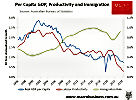 Outfits like the Grattan Institute argue that Australia needs to maintain a high immigration policy to maximise productivity growth. Their analysis consistently overlooks the empirical evidence showing that Australia’s productivity growth declined as immigration surged.
Outfits like the Grattan Institute argue that Australia needs to maintain a high immigration policy to maximise productivity growth. Their analysis consistently overlooks the empirical evidence showing that Australia’s productivity growth declined as immigration surged.
 This article looks at the Gaza Marine gas field, a modest 1.1–1.4 trillion cubic feet reserve off Gaza’s coast, often dismissed as too small to fuel conflict between Israel and Palestinians. Yet, its shallow depth, ease of exploitation, and potential to yield $2.4 billion for Gaza’s economy make it a strategic prize, as evidenced by Israel and Egypt’s 2023 development plans sidelining Gazans.
This article looks at the Gaza Marine gas field, a modest 1.1–1.4 trillion cubic feet reserve off Gaza’s coast, often dismissed as too small to fuel conflict between Israel and Palestinians. Yet, its shallow depth, ease of exploitation, and potential to yield $2.4 billion for Gaza’s economy make it a strategic prize, as evidenced by Israel and Egypt’s 2023 development plans sidelining Gazans. Super Members Council warns that allowing first homeowners to withdraw their super for a house deposit could see property prices rise by nearly $75,000 across Australia’s five largest capital cities, new modelling from the Super Members Council shows. Pouring retirement savings into housing would inflame an already-inflated property market – pushing up the major capital city median price by an estimated 9%.
Super Members Council warns that allowing first homeowners to withdraw their super for a house deposit could see property prices rise by nearly $75,000 across Australia’s five largest capital cities, new modelling from the Super Members Council shows. Pouring retirement savings into housing would inflame an already-inflated property market – pushing up the major capital city median price by an estimated 9%. Angus Deaton is the Dwight D. Eisenhower Professor of Economics and International Affairs, Emeritus, at the Princeton School of Public and International Affairs and the Economics Department at Princeton University. He is the 2015 recipient of the Nobel Memorial Prize in Economic Sciences.
Angus Deaton is the Dwight D. Eisenhower Professor of Economics and International Affairs, Emeritus, at the Princeton School of Public and International Affairs and the Economics Department at Princeton University. He is the 2015 recipient of the Nobel Memorial Prize in Economic Sciences. Donald Horne, who wrote ironically about Australia as '
Donald Horne, who wrote ironically about Australia as ' "The housing market is facing the worst housing affordability ever - yet house prices continue to show extreme strength. So what's the housing end game when the majority of people can't afford a home - what's the future for house prices. This video features sections from the video:
"The housing market is facing the worst housing affordability ever - yet house prices continue to show extreme strength. So what's the housing end game when the majority of people can't afford a home - what's the future for house prices. This video features sections from the video:  Mat Barrie, CEO of
Mat Barrie, CEO of  The 100 years from 1870 is described as the innovation century in which there more more inventions, starting coincidentally with the light bulb, than in the rest of mankind's history. For the most part their roll out into society was slow enough to dampen the impact of the invention, electricity wasn't connected fully in Australia until 1989. But for me there was one event that stood out and that occurred on on the 4th of October 1957 just before my birthday.
The 100 years from 1870 is described as the innovation century in which there more more inventions, starting coincidentally with the light bulb, than in the rest of mankind's history. For the most part their roll out into society was slow enough to dampen the impact of the invention, electricity wasn't connected fully in Australia until 1989. But for me there was one event that stood out and that occurred on on the 4th of October 1957 just before my birthday.
 Australia will reach one million people officially living with a Covid diagnosis within days – more than lung disease and cancer – with one in every 20 New South Wales and Victorian residents already contracting the virus, the latest VaxEnomicTM Forecaster from C-suite strategy group Provocate reveals.
Australia will reach one million people officially living with a Covid diagnosis within days – more than lung disease and cancer – with one in every 20 New South Wales and Victorian residents already contracting the virus, the latest VaxEnomicTM Forecaster from C-suite strategy group Provocate reveals. 
 Ex-UK Parliamentarian, Michael Heaver, in this video, says the UK has seen significant wage-growth in various industries, with an interruption to mass migration. He notes that Boris Johnson is currently calling for industry to stop relying on mass migration and to invest money in local industry and wages instead. Employers and Labor are, however, again calling for higher immigration. This comes in the light of the current UK crisis in petrol delivery which has seen drivers queuing for hours, even days, to fill their cars or containers, because lorry drivers are working for better wages outside that industry. Comments on the video indicate low trust that Boris Johnson will actually honour his words, however the topics covered in the video are informative and highly relevant to Australia. Michael Heaver comments, “And, rather than siding with British workers, it seems labour, as with a lot of business, their immediate knee-jerk reaction, to every issue in the labour market, is not to look at to raise wages and invest in the UK domestic workforce. It’s simply to go for cheap foreign labour. Now, this looks to be a major theme for the Conservatives going into their conference …”
Ex-UK Parliamentarian, Michael Heaver, in this video, says the UK has seen significant wage-growth in various industries, with an interruption to mass migration. He notes that Boris Johnson is currently calling for industry to stop relying on mass migration and to invest money in local industry and wages instead. Employers and Labor are, however, again calling for higher immigration. This comes in the light of the current UK crisis in petrol delivery which has seen drivers queuing for hours, even days, to fill their cars or containers, because lorry drivers are working for better wages outside that industry. Comments on the video indicate low trust that Boris Johnson will actually honour his words, however the topics covered in the video are informative and highly relevant to Australia. Michael Heaver comments, “And, rather than siding with British workers, it seems labour, as with a lot of business, their immediate knee-jerk reaction, to every issue in the labour market, is not to look at to raise wages and invest in the UK domestic workforce. It’s simply to go for cheap foreign labour. Now, this looks to be a major theme for the Conservatives going into their conference …”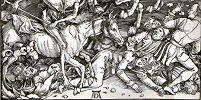 The mainstream media has given a great deal of coverage to the COVID-19 pandemic - as it should - but interwoven among the stories on poor vaccination rates, conspiracy theories, and the people ignoring quarantine, there is a consistent run of horror stories on the impact of lockdowns, often with a message that we must get back to the pre pandemic "normal" life. This is understandable, businesses are going broke, unemployment is rising, domestic violence and mental illness are increasing. It is an unpleasant situation, but returning to the old norm is not a solution. This, after all, was the lifestyle that created human movement into wilderness areas, bringing us into contact with pathogens that we have little resistance to combat.
The mainstream media has given a great deal of coverage to the COVID-19 pandemic - as it should - but interwoven among the stories on poor vaccination rates, conspiracy theories, and the people ignoring quarantine, there is a consistent run of horror stories on the impact of lockdowns, often with a message that we must get back to the pre pandemic "normal" life. This is understandable, businesses are going broke, unemployment is rising, domestic violence and mental illness are increasing. It is an unpleasant situation, but returning to the old norm is not a solution. This, after all, was the lifestyle that created human movement into wilderness areas, bringing us into contact with pathogens that we have little resistance to combat.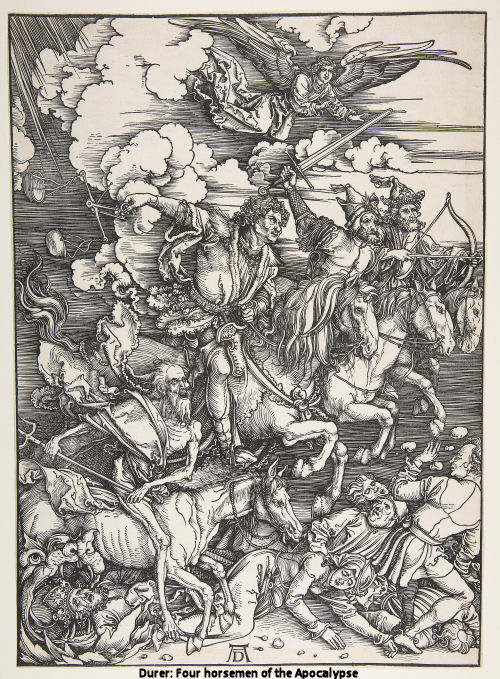
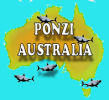 Innes Willox, the Chief Executive of the Australian Industry Group or
Innes Willox, the Chief Executive of the Australian Industry Group or 
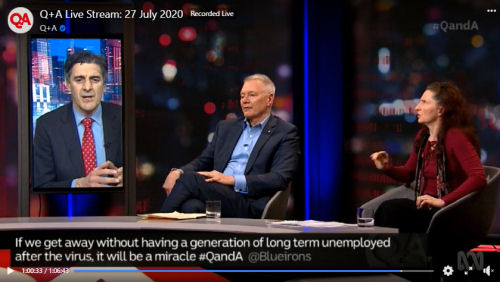

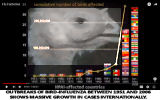 Will governments buy back vital resources and essential services from the embattled private sector, or will they allow the wealthy to pick up resources and monopolies cheaply, pressing the unemployed and endebted into slave-like conditions? Can we adapt to or avoid a future that appears to hold more and worse pandemics? If COVID-19 is a pandemic designed for elite purposes to cull the aged and weak, why have some governments tried to protect their vulnerable populations? We have obviously become too economically dependent on the model of continuous accelerated growth in human numbers and human activities globally to be able to protect ourselves from the pandemics that come with this economic model. At the same time the long-predicted oil-resources breakdown in supply is looming. Can any good come of this? Is this an opportunity?
Will governments buy back vital resources and essential services from the embattled private sector, or will they allow the wealthy to pick up resources and monopolies cheaply, pressing the unemployed and endebted into slave-like conditions? Can we adapt to or avoid a future that appears to hold more and worse pandemics? If COVID-19 is a pandemic designed for elite purposes to cull the aged and weak, why have some governments tried to protect their vulnerable populations? We have obviously become too economically dependent on the model of continuous accelerated growth in human numbers and human activities globally to be able to protect ourselves from the pandemics that come with this economic model. At the same time the long-predicted oil-resources breakdown in supply is looming. Can any good come of this? Is this an opportunity? 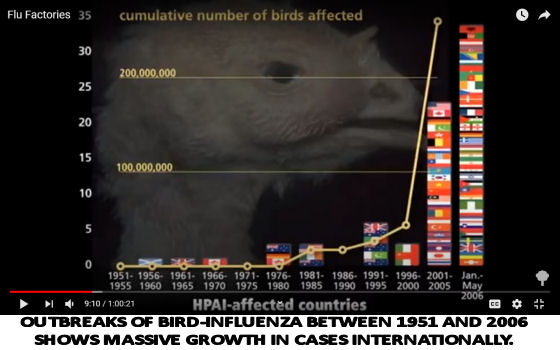
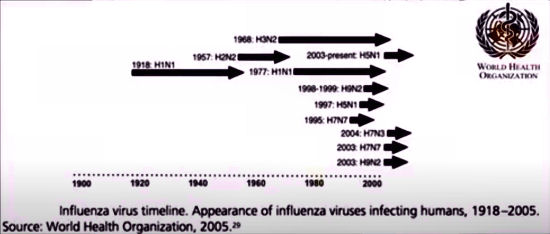
 In this article, Sally Pepper proposes that there is an economy with a small 'e' and The Economy with a big 'E'. As well as threatening its survival, COVID-19 has called the big E economy into question. Sally says, "The economy with a small 'e’ is a way of describing what we do. The Economy with a capital “E” is something we serve, whether we like it or not. To please The Economy we have to behave in such a way that it looks its best and is pleased with itself. The Economy seems to be like a teenage boy, with a voracious appetite. It never develops beyond the need to grow bigger, endlessly. It is like a monster that we have given rise to and are doomed to cater to forever."
In this article, Sally Pepper proposes that there is an economy with a small 'e' and The Economy with a big 'E'. As well as threatening its survival, COVID-19 has called the big E economy into question. Sally says, "The economy with a small 'e’ is a way of describing what we do. The Economy with a capital “E” is something we serve, whether we like it or not. To please The Economy we have to behave in such a way that it looks its best and is pleased with itself. The Economy seems to be like a teenage boy, with a voracious appetite. It never develops beyond the need to grow bigger, endlessly. It is like a monster that we have given rise to and are doomed to cater to forever."
 The 100 years from 1870 is described as the innovation century in which there more more inventions, starting coincidentally with the light bulb, than in the rest of mankind's history. For the most part their roll-out into society was slow enough to dampen the impact of the invention. Electricity, for instance, wasn't connected fully in Australia until 1989. But for me, one event stood out, and that occurred on the 4th of October 1957, just before my birthday.
The 100 years from 1870 is described as the innovation century in which there more more inventions, starting coincidentally with the light bulb, than in the rest of mankind's history. For the most part their roll-out into society was slow enough to dampen the impact of the invention. Electricity, for instance, wasn't connected fully in Australia until 1989. But for me, one event stood out, and that occurred on the 4th of October 1957, just before my birthday.
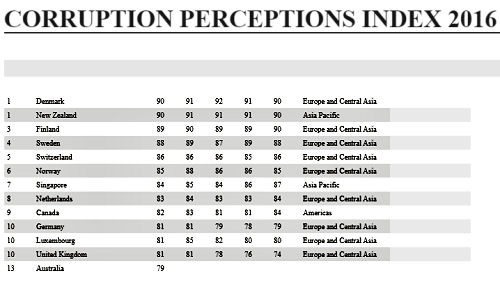
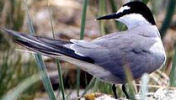 A group of birds that are not usually found in Australia attracted hundreds of birders to a relatively remote town on the north coast of NSW, resulting in a significant boost to the Australian economy.
A group of birds that are not usually found in Australia attracted hundreds of birders to a relatively remote town on the north coast of NSW, resulting in a significant boost to the Australian economy. Venezuela’s problems are not the result of the government issuing money and using it to hire people to build infrastructure, provide essential services and expand economic development. If it were, unemployment would not be at 33 percent and climbing. Venezuela has a problem the U.S. does not, and will never have: It owes massive debts in a currency it cannot print itself, namely, U.S. dollars. When oil (its principal resource) was booming, Venezuela was able to meet its repayment schedule. But when the price of oil plummeted, the government was reduced to printing Venezuelan bolivars and selling them for U.S. dollars on international currency exchanges. As speculators drove up the price of dollars, more and more printing was required by the government, massively deflating the national currency.
Venezuela’s problems are not the result of the government issuing money and using it to hire people to build infrastructure, provide essential services and expand economic development. If it were, unemployment would not be at 33 percent and climbing. Venezuela has a problem the U.S. does not, and will never have: It owes massive debts in a currency it cannot print itself, namely, U.S. dollars. When oil (its principal resource) was booming, Venezuela was able to meet its repayment schedule. But when the price of oil plummeted, the government was reduced to printing Venezuelan bolivars and selling them for U.S. dollars on international currency exchanges. As speculators drove up the price of dollars, more and more printing was required by the government, massively deflating the national currency. A recent interview of the Prime Minister by Leigh Sales in the 7.30 Report on Tuesday 29 January 2019 provided a good illustration of the lack of understanding of economics by ABC journos or their deliberate and calculated rejection of some simple truths. John Coulter has written to Leigh Sales as follows.
A recent interview of the Prime Minister by Leigh Sales in the 7.30 Report on Tuesday 29 January 2019 provided a good illustration of the lack of understanding of economics by ABC journos or their deliberate and calculated rejection of some simple truths. John Coulter has written to Leigh Sales as follows. 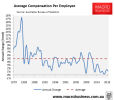 "What this debate is really about is not who gets what jobs but which elements of capital win along the way. McDonald and Richardson are obsessed with supporting the immigration-led urbanisation sectors to the detriment of tradables and wider community living standards as infrastructure fails to keep up, wages are crushed by the rush of cheap foreign labour and house prices shoot to stupid levels. McDonald is a demographer not economist so has no idea. Richardson has simply lost the macro plot. Before these dills came along with their immigration voodoo Australia and its labour market fared just fine and it will afterwards as well. In fact it will be better in time as the permanent supply shock of cheap foreigners killing wages and productivity ends, boosting income."
"What this debate is really about is not who gets what jobs but which elements of capital win along the way. McDonald and Richardson are obsessed with supporting the immigration-led urbanisation sectors to the detriment of tradables and wider community living standards as infrastructure fails to keep up, wages are crushed by the rush of cheap foreign labour and house prices shoot to stupid levels. McDonald is a demographer not economist so has no idea. Richardson has simply lost the macro plot. Before these dills came along with their immigration voodoo Australia and its labour market fared just fine and it will afterwards as well. In fact it will be better in time as the permanent supply shock of cheap foreigners killing wages and productivity ends, boosting income." 
 1973 saw many oil producing countries become independent and nationalise their oil. Some succeeded and others, like Australia, were brought to heal. Ever since 1973, the US and Europe have been trying to reverse these nationalisations. Venezuela is a case in point.
1973 saw many oil producing countries become independent and nationalise their oil. Some succeeded and others, like Australia, were brought to heal. Ever since 1973, the US and Europe have been trying to reverse these nationalisations. Venezuela is a case in point. Who really understands the inner workings of our “modern vibrant” economy - that finely tuned mechanism that gives everyone a fair go and preserves our way of life? Turns out it’s more like one of those classic Bruce Petty cartoons with machines with lots of levers and belching fumes at the hapless operator.
Who really understands the inner workings of our “modern vibrant” economy - that finely tuned mechanism that gives everyone a fair go and preserves our way of life? Turns out it’s more like one of those classic Bruce Petty cartoons with machines with lots of levers and belching fumes at the hapless operator. 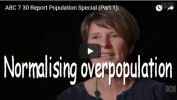 ABC 7.30 Report last night aired part one of its three-part population special, which included me as the economist. While I will reserve judgement until the final two-parts have been aired, my initial gut reaction is disappointment. The main problem I see with it so far is the ABC has inferred that a population of more than 40-million mid-century is inevitable rather than a direct policy choice. Nowhere did The ABC clearly show how the federal government massively increased Australia’s immigration intake from the early-2000
ABC 7.30 Report last night aired part one of its three-part population special, which included me as the economist. While I will reserve judgement until the final two-parts have been aired, my initial gut reaction is disappointment. The main problem I see with it so far is the ABC has inferred that a population of more than 40-million mid-century is inevitable rather than a direct policy choice. Nowhere did The ABC clearly show how the federal government massively increased Australia’s immigration intake from the early-2000 



 Interview begins around 9.40 minutes into the show.Gung-ho interviewer, Bart Chilton, apparently hoping to recommend investing in Australian stocks, found out that Australia's economy is about as diverse as Uganda's and Ethiopia's, that it consists of holes and houses, and that Australian governments have stupidly marketised energy, making costs too high for Australian manufactures. "Energy and telecommunications are both being disastrously mishandled." Banks and mines dominate the Australian stock exchange, which reminds Keen of when they dominated the Japanese stock exchange - just before the 1990 bubble burst, with no important banks situated in Japan anymore. Our stock market is trivial compared to our bond market. Dr Keen also mentions the
Interview begins around 9.40 minutes into the show.Gung-ho interviewer, Bart Chilton, apparently hoping to recommend investing in Australian stocks, found out that Australia's economy is about as diverse as Uganda's and Ethiopia's, that it consists of holes and houses, and that Australian governments have stupidly marketised energy, making costs too high for Australian manufactures. "Energy and telecommunications are both being disastrously mishandled." Banks and mines dominate the Australian stock exchange, which reminds Keen of when they dominated the Japanese stock exchange - just before the 1990 bubble burst, with no important banks situated in Japan anymore. Our stock market is trivial compared to our bond market. Dr Keen also mentions the
Recent comments